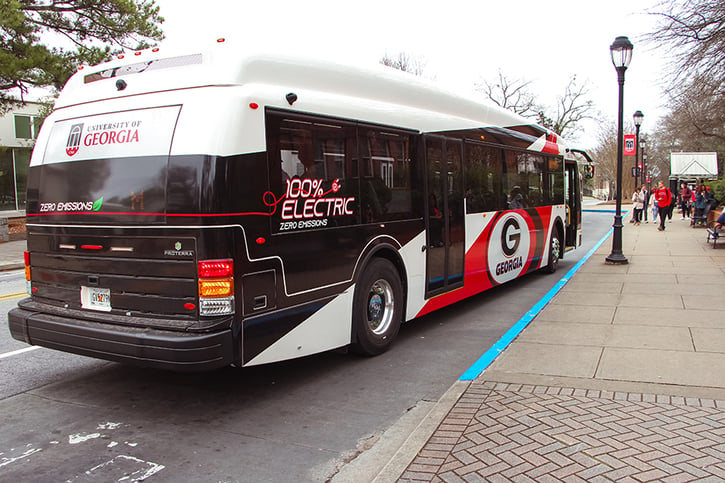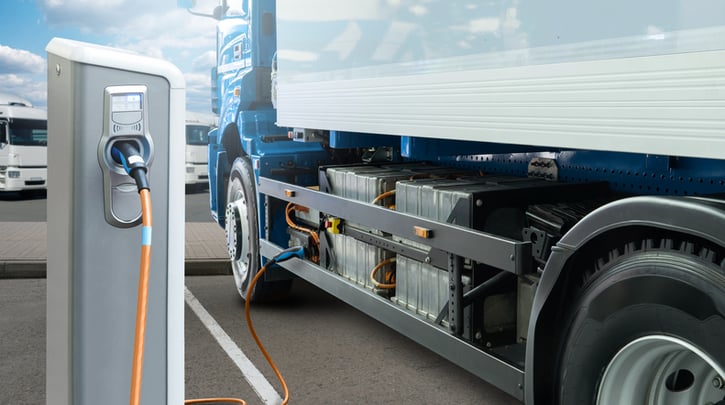The transportation sector is the largest source of emissions in Georgia. That’s why scaling climate solutions like electric vehicles, mass transit, and alternative transportation is crucial if we hope to achieve our climate goals in our state.
Why is reducing emissions in this sector so important, and how can we go farther faster in addressing the climate impact of transportation in our state? Join us on a deep dive into the current state of transportation climate solutions in Georgia, and the most effective areas to focus on.
How does transportation affect climate change?
Many human activities produce greenhouse gas emissions that accelerate climate change. From heating our homes to cooking our food to cleaning our clothes, many of our day-to-day actions impact our climate. The transportation that Georgia families, businesses, and industry utilize every day are no different.

When we talk about climate impacts and climate solutions in the transportation sector, we include all types of mobility in our communities. This includes emissions-creating forms of transportation like gasoline-powered cars and diesel-fueled trucks, as well as low or zero emissions options like mass transit, bicycling and e-scooters. Even strategies like carpooling and remote work/teleconferencing are transportation climate solutions as both can help reduce emissions from car traffic.
Why does transportation contribute to greenhouse gas emissions?
The combustion of fuels like gasoline and diesel in internal combustion engines are the cause of most emissions related to transportation. The largest sources of these emissions include passenger cars, medium- and heavy-duty trucks, and light-duty vehicles, such as SUVs, pickup trucks, and minivans.
In Georgia, these emissions result from the burning of fossil fuels to power our cars, trucks, buses, and trains. According to the U.S. Environmental Protection Agency, over 94% of the fuel used for transportation is petroleum-based, mainly gasoline and diesel fuels.
How do cars affect climate change?
Our state has nearly 90,000 miles of public roads. The vehicles that drive on those roads accounted for about 41% of the state’s emissions in 2021 -- our single largest source.

There are two types of emissions associated with transportation that come from the tailpipe when burning gasoline or diesel.
-
The first are GHG emissions that exacerbate climate change.
-
The second are criteria pollutants like nitrogen dioxide and sulfur dioxide. They cause human health issues and environmental problems like smog.
Battery electric vehicles use no gasoline or oil, so there’s no need for an exhaust system and tailpipe to emit the toxic emissions a gasoline-fueled car produces.
How much does transportation contribute to climate change in Georgia?
As of March 2023, transportation contributes about 5 million tons of emissions a month in Georgia. This includes emissions from passenger cars and light-duty vehicles, public transportation, and the large trucks and vans that handle shipping and deliveries across our state.
The transportation sector is by far the largest source of emissions in our state.
How can we reduce the impact of transportation on the environment in Georgia?
Switching out gasoline and diesel-powered vehicles for electric vehicles, increasing mass transit, and adopting more alternative transportation options will help us dramatically reduce transportation-related emissions.
EVs in Georgia emit almost 70% fewer GHG emissions annually compared to gasoline vehicles. This is because electric vehicles are so much more efficient and our electricity grid is getting cleaner every day.

A study from Yale found that when looking at all emissions from cradle to grave, "the total indirect emissions from electric vehicles pale in comparison to the indirect emissions from fossil fuel-powered vehicles…..The supply chain for combustion vehicles is just so dirty that electric vehicles can’t surpass them, even when you factor in indirect emissions.”
Even when you account for the carbon emissions from those fossil fuel-powered plants, driving an EV in Georgia produces approximately 2.5 times fewer carbon emissions than driving a gas vehicle. Emissions can increase even further as we continue to add solar to the grid and to public charging stations.
What are the benefits of electrifying transportation?
Electric vehicles can reduce CO2 emissions in Georgia compared to most comparable conventional vehicles. These reductions could grow significantly (up to 50% per vehicle by 2030) if Georgia’s electricity grid continues to become lower emitting.
We could reduce 1 megaton (Mt) of carbon dioxide equivalent (CO2e) in Georgia by replacing 250,000 gasoline-powered vehicles with electric vehicles - that is just 4% of vehicles registered in the state.
Electric vehicles offer environmental and public health benefits from localized air quality improvements. This solution can also create jobs associated with manufacturing, selling, installing, and maintaining batteries and other EV components.

For example, the University of Georgia operates a fleet of 33 electric buses - currently one of the largest electric fleets in the entire country - on its campus. Since the buses were introduced, the university has observed multiple benefits, including:
-
The electric fleet reduces net greenhouse gas emissions by 70% compared to diesel buses, preventing over 4.5 million pounds of carbon emissions annually.
-
The lack of diesel tailpipe emissions is creating a cleaner environment on campus, which is a health benefit for all bikers and pedestrians.
-
The electric buses are also saving the university money. When accounting for fuel, maintenance, and depreciation, diesel buses cost between $150-200 per day to operate; each new electric bus costs only $14 per day in comparison.
-
Additionally, each electric bus may last up to 30 years, which is more than twice the life expectancy of a diesel bus.
Can electrified transport make cities more resilient?
In addition to reducing air pollution, improving public health, and creating jobs, electrifying transportation can help make our cities more resilient.
Using bidirectional charging technology, electric vehicle batteries could be used to power homes and even communities during a blackout. Vehicle-to-home (V2H) and vehicle-to-grid (V2G) use a converter in the car’s charger to power your home using the vehicle’s battery or even send electricity from the battery back to the grid.

Marginalized communities are often at the greatest risk of experiencing stronger storms and other climate disasters, so a network of EVs with V2G capabilities could help provide a crucial safety net for communities in crisis.
Are electric vehicles energy efficient?
The fuel efficiency for most electric cars is over 100 MPGe, or miles per gallon equivalent. As an owner of an EV, this means that you use less energy to get from point A to point B, helping to save money on fuel costs. It’s no surprise that the cheapest fuel is the fuel you don’t use.
Are electric cars more energy efficient than gas cars?
Electric vehicles are significantly more energy efficient than gasoline-powered cars. The average fuel efficiency for gasoline-powered cars in the US is 25.7 mpg, compared to the equivalent of 100 miles per gallon for the typical electric car.
According to the U.S. Department of Energy, EVs convert over 77% of the electrical energy from the grid to power at the wheels. Conventional gasoline vehicles only convert between 12%–30% of the energy stored in gasoline into power at the wheels.
Are electric cars more expensive than gas cars?
Electric vehicles can carry a higher price tag than gasoline cars, but the purchase price isn’t the full story. Allie Kelly, executive director at The Ray, explains,
“EVs require less maintenance and are more cost-effective for owners over the lifetime of the vehicle. Because a purely electric vehicle has significantly fewer moving parts than its traditional gas-powered counterpart, they have lower maintenance and repair costs and cost less to fuel. On average, consumers who purchase an EV can expect to save $4,600 in costs over the life of the vehicle, easing them near a price parity to gas-powered vehicles.”
What about energy-efficient cars?
A range of cost-effective technologies are available to reduce or replace petroleum fuel use in light-duty vehicles, including cars and pickups.
What is an energy-efficient car?

Among these, hybrid cars deliver the most substantial reductions, pairing an electric motor and battery with an internal combustion engine. The combination enables the vehicle to regenerate braking loss, and operate both engine and motor at greater efficiency, improving fuel economy and lowering emissions.
How do I know if my car is energy efficient?
Energy-efficient vehicles are often hybrids that reduce fuel use by using battery electric power to partially power the vehicle. One way of identifying energy-efficient cars and trucks is by looking for vehicles that have achieved a minimum green score of 40 on the American Council for an Energy Efficient Economy (ACEEE) annual vehicle rating guide.
Is it better to buy a hybrid or an all-electric car?
A vehicle is a major purchase, and there are many different considerations to take into account when choosing between a hybrid vehicle and an EV.
Hybrid cars can be less expensive to purchase, and provide drivers with the flexibility of using both gasoline and electricity to power the vehicle. This can be especially useful in areas where charging infrastructure is still developing.
Electric vehicles may have a higher upfront price, but can save owners significantly over the life of the vehicle by costing less to drive and maintain than even a hybrid vehicle. An EV is also the best choice for reducing emissions.
Does public transportation reduce emissions?
The Drawdown Georgia research team estimates that mass transit options in Georgia (MARTA in Atlanta in particular) release 0.245lbs CO2/passenger mile, over one third less than the 0.891lbs CO2/passenger mile emitted by a typical single occupancy vehicle.

Mass transit can become even more efficient as ridership percentages rise, since the system increases in efficiency. There is potential for significant avoided emissions for most trips so long as ridership is sufficiently high.
Beyond directly replacing existing trips, the availability of transit alters land use patterns that result in fewer or shorter vehicular trips, which in turn helps to reduce tailpipe emissions. In reviewing the literature, one comprehensive study found that CO2 emissions can be on the order of 70% lower than diesel emissions for EV bus applications in a simulation of European and California contexts.
How can Georgia companies reduce carbon emissions from transportation?
If we are to achieve our climate goals, it’s essential that Georgia businesses and industry take action to reduce emissions, and reducing transportation-related emissions in these sectors can go a long way.
One simple way that businesses can reduce emissions is by addressing employee commutes. Business owners can encourage working from home and carpooling, or take steps to locate offices and other facilities near public transportation. Providing EV charging stations for use by employees and/or customers is another way that Georgia businesses can be part of the solution.

Electrifying shipping networks is another climate solution in this sector that is beginning to grow in Georgia and across the world. Freight transportation currently accounts for nearly 8% of global emissions, but recent advancements in vehicle and fuel technologies offer new pathways to sharply reduce freight emissions in the coming years.
Because of these advancements, the U.S. Department of Energy predicts that, even without incentives, the cost to purchase, operate, and maintain zero-emission medium- and heavy-duty vehicles will drop to match the costs of conventional diesel vehicles by 2035.
Companies like Einride, a Swedish transport company specializing in electric and self-driving vehicles, are partnering with companies around the world to help reduce freight costs and reduce emissions by as much as 90%. Einride is now operating in seven U.S. states and is a member of the Drawdown Georgia Business Compact.
In our state, shipping and logistics company Wallenius Wilhelmsen is now using Einride battery electric trucks for heavy haul trucking between the port of Savannah and the company’s processing center in Pooler, Ga. Einride estimates that the three electric trucks employed by Wallenius Wilhelmsen alone will save approximately 200 metric tons of CO2 emissions per year.
Beyond carbon: how will reducing transportation carbon emissions improve equity?
The emissions from gasoline-powered vehicles don’t just contribute to climate change, they also pollute the air with gasses and other chemicals that can have detrimental effects on human health. The pollutants found in vehicle exhaust have been found to adversely impact nearly every organ system in the body.
The communities most impacted by polluted air are low-income and BIPOC communities in Georgia and across the country. In the United States, people of color are 3.5 times more likely to live in a county with a failing air quality grade than white people.
Replacing gasoline vehicles with EVs and electric trucks would improve local air quality and help reduce the rates of asthma and other common illnesses associated with exposure to vehicle exhaust.

The reduced costs of driving and maintaining an EV would also be of great benefit to low- and moderate-income Georgians, although the high upfront cost remains a barrier for many families. The $4,000 tax credit available for the purchase of a used EV introduced by the Inflation Reduction Act is helping to put EVs within reach of more Americans, but there is still more work to be done to make the benefits of EVs accessible to all.
Scaling Transportation Climate Solutions in Georgia
Are you ready to take action and do your part to reduce transportation emissions in our state? Whether that means choosing to walk or take public transit to get where you’re going or installing EV chargers at your local business, there are ways for all of us to get involved in climate solutions.
You can learn all about the benefits of upgrading to an electric vehicle in Georgia and find answers to common questions in our free toolkit.







